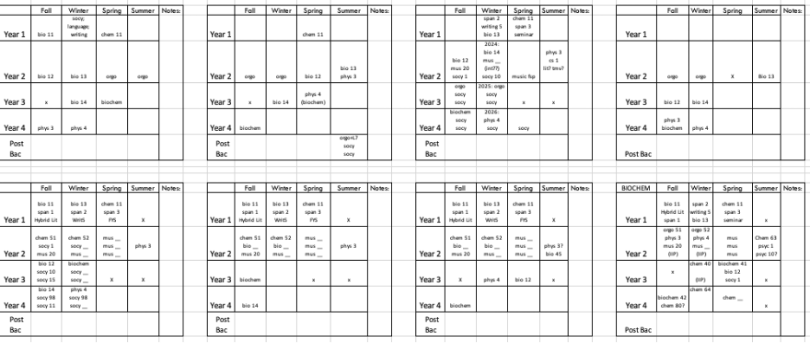
Everything I Wish I Knew About Being Pre-Health at Dartmouth, Two (And 3/10) Terms In
Dartmouth College wasn't on my radar as a school for pre-health students, but I've found that being pre-health, at least for my first two terms, has been full of moments of discovery and connection; I get to find a bit of community when hearing the "oh, yeah, I'm pre-med too!" from people I meet.
When entering the school as a prospective pre-health student, there wasn't much that I knew about the school's pre-health system. I am not very far down the track, and I have a lot to learn—I've only done one out of the many courses needed for the pre-health track as of writing this post. However, being so fresh on the track does mean that I remember a lot of the questions I had when I was scouting the pre-health track. Here's a little bit of what I now know about being pre-health at Dartmouth!
Planning Classes
Planning the pre-health track has something extra in Dartmouth: The D-Plan. The D-Plan is a system unique to Dartmouth, in which students can choose when to be on campus or off campus (like choosing when your 'summer' break is), with a strong recommendation to stay on campus for their second summer (known as Sophomore Summer). Essentially, it leads to some flexibility in crafting one's experience at Dartmouth. You can learn a little more about it here!
With the flexibility, however, comes extra planning for when I will take certain pre-medical classes, since classes are not offered every term.
The pre-medical track at Dartmouth consists of 10-12 classes:
- 1 math class (calculus)
- 1 statistics class
- 2 biology foundation courses
- 1 or 2 intro chemistry courses
- 2 organic chemistry courses
- 1 biochemistry course
- 1 or 2 physics courses
You can learn more about the requirements here: Some classes can be settled with AP/IB credit, which can be seen here.
Coming in, I found this list of classes alluring. I thought that it would be fun to take these classes especially if I wasn't going to be a science major—and it's been true! Of the two pre-medical courses I've taken (Bio 13: Genetics; Chem 11: Intro Chemistry), both have been pretty enjoyable so far. Determining when I will take classes while fitting in a music minor and another major has been a puzzle. Like a puzzle, I have a bunch of pieces to fit, and like a puzzle, it won't come super easy!

Resources
However, there are resources available for me to figure out what classes and what majors may be right for me; for example, I have my faculty advisor and Undergraduate Dean, who are both dedicated to helping students organize their D-Plans and classes. Additionally, for pre-health students, there is a pre-health advisor, Sarah Berger, who can help organize D-Plans specifically for pre-health courses. At my first meeting with her, she ran down many class organization possibilities that make sure all my requirements would get in on time.
There are also different opportunities for pre-medical enrichment! Many of them exist through the Nathan Smith Society, a group for premedical students that offers opportunities, articles, and talks surrounding medicine. Also, with the nearby Geisel School of Medicine and the Dartmouth-affiliated Dartmouth-Hitchcock Medical Center, which is just a short bus ride away, the distance from medical exposure and opportunities is small!
For your future search
I was a little reluctant about the pre-health track—and I still require a lot of self-reflection about it—but I've found that it's easier to step off the track than to get on late. I'm only two terms in! Who knows what'll happen in my future years at Dartmouth. Talking to upperclassmen who have both stayed on the track to the end and to those who decided to take on a different path, I realized that no choice is wrong, as long as it's one's personal choice.
But for those who are considering going on the track, here are a couple of questions to get started!
- What are the premedical requirements of the school, and what fraction of the classes will it be throughout one's whole time at a school?
- What is the school's method in choosing one's classes?
- What are some other graduation requirements of the school? Could some pre-med and graduation requirement schools overlap?
- What resources of support are there/opportunities? Advisors? Schools? Hospitals?
I hope that's helpful! I find that Dartmouth's rigorous classes and schedule make the classes more engaging, and the availability of professors, teaching assistants, and other academic help makes the journey worth it (so far). In fact, the plethora of opportunities available for pre-medical students give me some FOMO when not attending them!
















